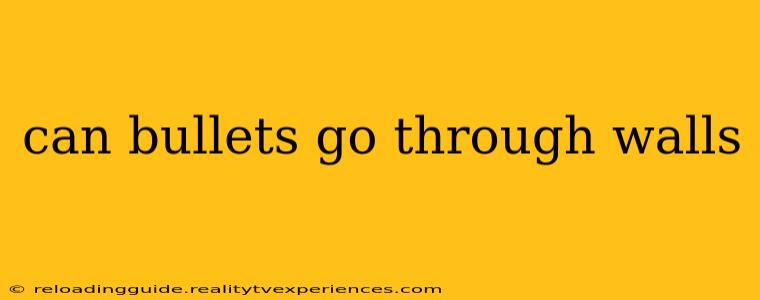Can Bullets Go Through Walls? It Depends...
The question of whether bullets can go through walls isn't a simple yes or no. The answer depends on a complex interplay of factors, making it crucial to understand the physics involved and the variables at play. This isn't just a matter of academic curiosity; understanding projectile penetration is vital for safety, construction, and even law enforcement.
Factors Affecting Bullet Penetration Through Walls:
Several key factors determine whether a bullet will penetrate a wall, and to what extent:
-
Caliber and Type of Bullet: Larger caliber bullets (e.g., .44 Magnum) generally have more kinetic energy than smaller caliber bullets (e.g., .22LR), making them more likely to penetrate. The bullet's design also matters significantly. Full metal jacket (FMJ) rounds, designed for penetration, will typically perform differently than hollow point rounds designed for expansion and stopping power within a target. The material of the bullet (lead, copper, etc.) also plays a role in its ability to penetrate.
-
Velocity of the Bullet: A faster-moving bullet carries more energy, increasing its chances of penetrating a wall. This is directly related to the firearm used and the ammunition's characteristics.
-
Type of Wall: This is perhaps the most significant factor. The material the wall is made of dramatically affects penetration. A thin sheet of drywall will offer significantly less resistance than a thick concrete or brick wall. The density and composition of the material are critical. For example, a solid concrete wall will be far more resistant than one containing voids or air pockets. The presence of reinforcing materials, such as steel rebar in concrete, will also significantly increase resistance to penetration.
-
Angle of Impact: A bullet striking a wall at a perpendicular angle (90 degrees) will have a greater chance of penetrating than one striking at an oblique angle. An angled shot spreads the impact force over a larger area, reducing the penetration potential.
-
Distance from the Muzzle: As the bullet travels, it loses velocity and energy due to air resistance. A bullet fired from a closer distance will have a greater chance of penetration than one fired from a greater distance.
Different Wall Materials and Their Resistance:
Let's look at common wall materials and their resistance to bullet penetration:
-
Drywall: Offers minimal protection against most handgun and rifle calibers.
-
Wood: The type of wood, thickness, and density significantly impact resistance. Hardwoods generally offer better protection than softwoods.
-
Brick: Offers moderate to good protection depending on the thickness and mortar used.
-
Concrete: Generally provides excellent protection, especially in thicker sections reinforced with steel.
-
Steel: Highly resistant to most small arms fire, offering excellent protection.
Conclusion:
Determining whether a bullet can penetrate a wall requires considering all these variables. While a general statement that "bullets can go through walls" might be true in many instances, it's far more accurate to say that the probability of penetration depends on a complex interplay of factors. This information highlights the importance of safe firearm handling, responsible ownership, and understanding the potential risks associated with firearms. This should not be interpreted as an encouragement to test any of these scenarios. Always prioritize safety.

